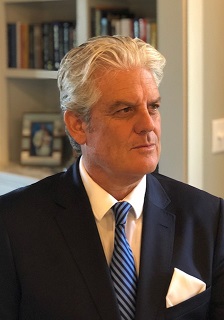From the CEO – November 2019

Dear Clients,
The fall months bring cooler weather to the PRS offices, and the (pre-holiday) season also ushers in the time to revisit some of our favorite works of literature. There is a point to raising this annual occurrence, since it has a connection to one of the main currents of political risk affecting our universe of country coverage over the last couple of months.
One of the main themes of Gustave Flaubert’s Sentimental Education – an utterly captivating novel set amid the social upheaval of the Revolution of 1848 – centers around the vagaries of desire. As most who have read the book know, Frédéric Moreau, the main character, only pursues those things he cannot have: Whether it is becoming an avocat, his irresolute commitment to several investment ideas, or his sporadic pursuit of Madame Arnoux. All such quests are eventually rejected.
Similarly, various characters debate the ultimate purpose of art: from Pellerin, who initially sees its sole purpose as the pursuit of beauty, but later concludes that art is about variety. Others see art’s goal as lifting the moral standards of the masses!
Either way, a parallel between the mercurial nature of human desire and thoughts and political risk can be drawn.
If you read my client letter from October, it was clear that it was a relatively subdued month for political risk, despite the large number of changes to the ratings and forecasts of many ICRG countries. We noted that there was a bottoming out of economic risk numbers throughout much of Europe; that the crisis in Chile spurred reforms and a rate cut by the central bank; and that Carrie Lam would likely be removed by Beijing from Hong Kong’s top post by next year (but the move would do little to temper the protests). As such, market moves via political risk would be largely episodic, confined to the country in question, as opposed to moving the entire emerging market asset class.
November, by contrast, was much more consistent in terms of seeing overall levels of political risk rise. Almost half of the countries we covered were affected, with some 80 individual political risk metrics adjusted. Protests, slowing growth, and deteriorating external conditions tended to worsen a large array of country risk profiles, with Latin America seeing the most significant increases. Indeed, in the region, only Venezuela saw its political risk score improve, largely due to Madura’s staying power, poorly organized protests, and the country’s election to the UN Human Rights Council (UNHRC).
More specific adjustments are worth noting. Chile’s continued turmoil sent the peso sliding against the USD, while the main parties agreed to work towards a new constitution. Ecuador barely escaped sliding into the ‘High Risk’ category (composite score) as social turmoil rose and the country’s dollar bonds sold off.
In France, Macron’s approval rating slipped amid strike action over pension reform. Conversely, Italy’s PM saw his numbers improve, but so did those for Lega.
In Africa, a corruption crackdown in Kenya continues as concerns over expropriation of tea plantations mount. And continued uncertainty over the true state of health and ability to carry out day-to-day duties of Gabon’s Bongo reign, amid suggestions that tensions with the cabinet are at a boiling point.
Myanmar’s elections for 2020 loom on the horizon but the military will retain its pre-eminence in political and parliamentary life. Hong Kong’s District Council elections produced landslide victories for pro-democracy candidates, but unrest and clashes between protestors and police will continue. Interestingly, Hong Kong equities continue their upward trajectory since mid-November.
We would like to welcome some new clients this month, including IWC Investment Partners, Deakin University, Boston University, and the SW University of Finance (China). We’d also like to welcome back to the PRS family Wells Fargo Asset Management, Banca d’Italia, the National University of Singapore, and Chicago Equity Partners, to name a few. Thank you so much for your (longstanding) support!!
Clients may wish to note that I will be in NYC in early December for client meetings and to attend the Annual Meeting of the Emerging Markets Traders’ Association. I will also have the pleasure of stopping by the offices of Aperture Investors and shoot some informative videos with Peter Marber, Portfolio Manager of the firm’s New World Opportunities Fund and co-author/editor with me for Quid Periculum? Measuring and Managing Political Risk in the Technology Age – a new book on political risk ready for an early 2020 release.
Topics for the videos will include the changing nature of political risk, challenges facing the industry, the role of globalization, and some of the riskiest countries and markets for 2020!
I will also be a guest speaker at the College of Charleston’s 6th Annual Strategic Investment Symposium in March 2020. Talking about the interface between quant-generated political risk and investment, I will be joined by specialists from JP Morgan, Wells Fargo, Goldman Sachs, and Evermore Global Advisors.
We are excited to be in the early working stages of a partnership with a longstanding Geneva/UK-based asset manager to combine our geopolitical data into an artificial intelligence application to generate unique and investible insights to global macro portfolio managers. Stay tuned for the official press release.
Finally, it’s always worth noting that academics have used ICRG data for years to determine their impact on stock market returns. Some have found the ratings capable of predicting market movements; others discovered the data to be significant in explaining return variation in individual emerging markets; still, others found that emerging markets experiencing political risk upgrades exceed those in emerging markets experiencing risk downgrades by 11% a quarter.
Thanks for your continued support, and please contact us if we can be of any assistance.

Chief Executive

PRS INSIGHTS
Moving beyond current opinions, a seasoned look into the most pressing issues affecting geopolitical risk today.
EXPLORE INSIGHTS SUBSCRIBE TO INSIGHTS
